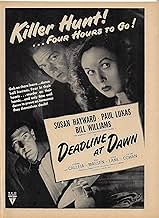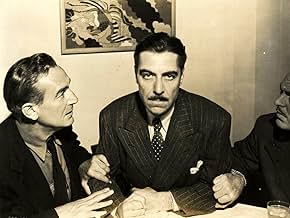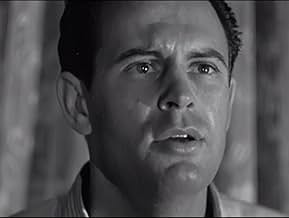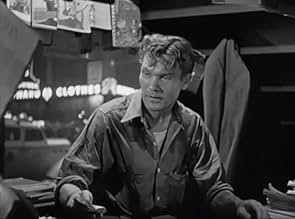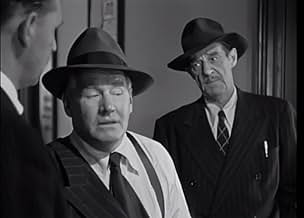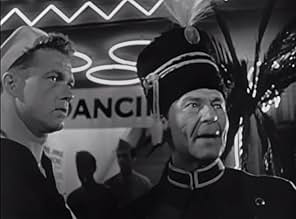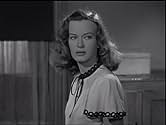NOTE IMDb
6,8/10
2,5 k
MA NOTE
Le dernier jour de sa permission à New-York, un jeune marin se réveille avec une grosse somme d'argent en poche. Il l'a pris chez une femme avec laquelle il a bu, mais ne se souvient plus de... Tout lireLe dernier jour de sa permission à New-York, un jeune marin se réveille avec une grosse somme d'argent en poche. Il l'a pris chez une femme avec laquelle il a bu, mais ne se souvient plus de rien.Le dernier jour de sa permission à New-York, un jeune marin se réveille avec une grosse somme d'argent en poche. Il l'a pris chez une femme avec laquelle il a bu, mais ne se souvient plus de rien.
- Réalisation
- Scénario
- Casting principal
- Récompenses
- 1 nomination au total
Ernie Adams
- Waiter
- (non crédité)
Fred Aldrich
- Beefy Nightclub Guest
- (non crédité)
Walter Bacon
- Commuter
- (non crédité)
John Barton
- One-Legged Man
- (non crédité)
Billy Bletcher
- Waiter
- (non crédité)
Avis à la une
A decent story based on a novel by Cornell Woolrich, good performances, and snappy dialogue by Clifford Odets elevate "Deadline at Dawn" from 1946. A small film, clocking in at 83 minutes, it packs in a lot of drama.
The film begins with a blind man (Marvin Miller, Mr. Anthony from "The Millionaire") visiting a young woman and demanding $1400 that he is owed. Next thing you know, she's dead.
A young sailor on leave, Alex, (Bill Williams) sobers up after a blackout and sees that he has a lot of money that belonged to one Edna Bartelli (Lola Lane), a girl who invited him to her home to "fix her radio."
Alex has the radio, and at a dime a dance place, he asks for help from June Goth (Susan Hayward) to help him return it. When they get to Edna's, she's dead. Alex is afraid that he did it, but he can't remember.
His leave ends in four hours, so that's all they have to find out what happened. They team up with a friendly cab driver (Paul Lukas). In their investigation, they meet a bunch of low-lifes and it becomes apparent that Edna had a few enemies.
Both Hayward and Williams give delightful performances. Hayward vacillates from the tough girl she is at the dance hall and softness as she gets to know Alex. Williams, who was TV's Kit Carson is the dad of actor William Katt ("Greatest American Hero") and the husband of Perry Mason's Barbara Hale.
True to its New York City wee small hours of the morning scenario, the film is peppered with various actors, each with his or her own story: Joseph Calleia, Osa Massen, Stephen Geray, Roman Bohen, and Constance Worth.
Harold Clurman, a theater director, directed this with an excellent idea of what it's like to be in New York City in the summer - hot, and the weirdos who come out at night.
Very entertaining, though probably too ambitious given the budget and time frame. The ending is a little convoluted.
The film begins with a blind man (Marvin Miller, Mr. Anthony from "The Millionaire") visiting a young woman and demanding $1400 that he is owed. Next thing you know, she's dead.
A young sailor on leave, Alex, (Bill Williams) sobers up after a blackout and sees that he has a lot of money that belonged to one Edna Bartelli (Lola Lane), a girl who invited him to her home to "fix her radio."
Alex has the radio, and at a dime a dance place, he asks for help from June Goth (Susan Hayward) to help him return it. When they get to Edna's, she's dead. Alex is afraid that he did it, but he can't remember.
His leave ends in four hours, so that's all they have to find out what happened. They team up with a friendly cab driver (Paul Lukas). In their investigation, they meet a bunch of low-lifes and it becomes apparent that Edna had a few enemies.
Both Hayward and Williams give delightful performances. Hayward vacillates from the tough girl she is at the dance hall and softness as she gets to know Alex. Williams, who was TV's Kit Carson is the dad of actor William Katt ("Greatest American Hero") and the husband of Perry Mason's Barbara Hale.
True to its New York City wee small hours of the morning scenario, the film is peppered with various actors, each with his or her own story: Joseph Calleia, Osa Massen, Stephen Geray, Roman Bohen, and Constance Worth.
Harold Clurman, a theater director, directed this with an excellent idea of what it's like to be in New York City in the summer - hot, and the weirdos who come out at night.
Very entertaining, though probably too ambitious given the budget and time frame. The ending is a little convoluted.
This is a strange little movie, which I'm sure is primarily due to Clifford Odets bizarre screenplay, but I freely admit that I really enjoyed it! The plot is somewhat convoluted (although not as hard to follow as some make out) and the ending is a little 'feel good' for a noir but Odets' dialog is what will bring you into it - or push you out. I still can't figure if the way his characters speak is closer to real life than 'regular' movie dialog, or nothing at all like anyone speaks; it somehow manages to be a little of both. One thing for sure is this is not how people normally speak in movies. Strong performances by Susan Hayward and Paul Lukas contribute to the fun; and that's what I found it to be. You've got likable characters, clever dialog, a mystery to solve before dawn, and Susan Hayward looking as good as I can remember. What else do you need?
This modest film noir is flat-out crazy and a tremendous amount of fun.
Bill Williams plays a sailor on leave who follows a floozy back to her room, passes out and then finds upon waking that the floozy is dead and can't remember what if anything he had to do with it. He's got to catch a boat (or is it train?) at dawn, and is afraid he'll be implicated in the murder if he doesn't find the true killer before then. He teams up with a dance hall hostess (Susan Hayward) and, before the evening's out, a cab driver (Paul Lukas) and sets out into the New York midnight to solve the crime.
The screenplay doesn't make a lick of sense, and my wife and I found ourselves actually laughing at the preposterous developments and turns in the story. It's hilarious how committed these three people are to solving this crime despite the fact that there's absolutely nothing attaching the sailor to it, and how easy a time they have following up on clues in as huge a city as NY despite the fact that the clues are things like "he was wearing a tuxedo" and "she had blonde hair." A plot twist at the movie's end, when the real killer is revealed, is right up there with the best of them. Oscar winner Paul Lukas brings much more acting ability to his performance than his role requires, and Susan Hayward is absolutely riveting. This was my first and so far only exposure to this acclaimed actress, and I look forward to many more.
What a blast this movie is!
Grade: A-
Bill Williams plays a sailor on leave who follows a floozy back to her room, passes out and then finds upon waking that the floozy is dead and can't remember what if anything he had to do with it. He's got to catch a boat (or is it train?) at dawn, and is afraid he'll be implicated in the murder if he doesn't find the true killer before then. He teams up with a dance hall hostess (Susan Hayward) and, before the evening's out, a cab driver (Paul Lukas) and sets out into the New York midnight to solve the crime.
The screenplay doesn't make a lick of sense, and my wife and I found ourselves actually laughing at the preposterous developments and turns in the story. It's hilarious how committed these three people are to solving this crime despite the fact that there's absolutely nothing attaching the sailor to it, and how easy a time they have following up on clues in as huge a city as NY despite the fact that the clues are things like "he was wearing a tuxedo" and "she had blonde hair." A plot twist at the movie's end, when the real killer is revealed, is right up there with the best of them. Oscar winner Paul Lukas brings much more acting ability to his performance than his role requires, and Susan Hayward is absolutely riveting. This was my first and so far only exposure to this acclaimed actress, and I look forward to many more.
What a blast this movie is!
Grade: A-
A young sailor on leave wakes up at midnight in a newsstand with bundles of money in his pockets and no recollection of his time spent with the wrong woman. Of course she turns out to be dead and he has until a bus leaves at 6am to discover the culprit or he gets the rap.
I like films with concentrated wandering, this one has it, the entire film like a slow ride across New York after hours in the backseat of a cab with windows rolled down, it's the middle of August, the macadam breathing out the day's heat again, or like lounging by the open window of your apartment with lights turned off, glimpses of strange figures stalking the empty and sweltering streets below and imagining mischief from them.
It has mood above all, latenight paranoia being sweated out from pores in the skin. Everything looks a bit unhinged in that magic-desolate way that is summer in the big city.
But this is deeply noirish in a key way, the way of the dumb guy's dream that crystallizes the essence of noir. Our man was out at night dreaming but has no recollection what about, except it involved offers of sex and illicit money. We presume he's innocent because of his naive blond looks and because he's the one telling the story, and is bewildered as he does, because more likely suspects are paraded, stories are piled, testimonies, conjecture, a drunk man uncovers hidden truth, a cab driver reflects about love, but the puzzle persists, the puzzle that is the night of life; we cannot really know, there is a blank spot at the center. Emptiness behind the stories that we make up to narrate our private worlds.
You will need no more eloquent parallel about what this is all about than a blind pianist among the suspects and being - mistakenly - sussed from his melodramatic reaction.
So we have sinister happenings back in the waking world, itself rendered as something you wake up from. Then our film as a dream attempting inner balance, so of course thick in coincidence, in strange but kind souls assisting, capped off with a miraculous revelation in the end that absolves guilt.
This is truly wonderful stuff that has burned itself into my visual imagination. It's clean and dark both, the shadows all in having traveled, having dreamed the night away.
I like films with concentrated wandering, this one has it, the entire film like a slow ride across New York after hours in the backseat of a cab with windows rolled down, it's the middle of August, the macadam breathing out the day's heat again, or like lounging by the open window of your apartment with lights turned off, glimpses of strange figures stalking the empty and sweltering streets below and imagining mischief from them.
It has mood above all, latenight paranoia being sweated out from pores in the skin. Everything looks a bit unhinged in that magic-desolate way that is summer in the big city.
But this is deeply noirish in a key way, the way of the dumb guy's dream that crystallizes the essence of noir. Our man was out at night dreaming but has no recollection what about, except it involved offers of sex and illicit money. We presume he's innocent because of his naive blond looks and because he's the one telling the story, and is bewildered as he does, because more likely suspects are paraded, stories are piled, testimonies, conjecture, a drunk man uncovers hidden truth, a cab driver reflects about love, but the puzzle persists, the puzzle that is the night of life; we cannot really know, there is a blank spot at the center. Emptiness behind the stories that we make up to narrate our private worlds.
You will need no more eloquent parallel about what this is all about than a blind pianist among the suspects and being - mistakenly - sussed from his melodramatic reaction.
So we have sinister happenings back in the waking world, itself rendered as something you wake up from. Then our film as a dream attempting inner balance, so of course thick in coincidence, in strange but kind souls assisting, capped off with a miraculous revelation in the end that absolves guilt.
This is truly wonderful stuff that has burned itself into my visual imagination. It's clean and dark both, the shadows all in having traveled, having dreamed the night away.
The real star of this underappreciated noir is Clifford Odets' dialogue, which you either love or you hate. I love it. Really terrific performances, and even the bit players are memorable. Look for Group Theater vet Roman Bohnen in a tiny role as the building janitor with a dead cat-- "she could practically speak." Or Jerome Cowan, a B-movie actor in a zillion Forties flicks, wonderfully slimy as a Broadway producer. Filmed on a backlot, but it seethes New York more than most location movies.
Le saviez-vous
- AnecdotesJoe Sawyer's character of washed-up baseball player Babe Dooley was based on Chicago Cubs hitting great Hack Wilson whose alcoholism led to his steep professional and personal decline.
- GaffesAt the end, the main characters exit the 8th Police Precinct. It is night, and the streets are deserted. Yet when June and Alex drive away in the police car, it can be seen through the back window of the vehicle that the streets are bustling with activity, cars, and people, and it's bright and sunny.
- Citations
June Goffe: If you hear a peculiar noise, it's my skin creeping.
- ConnexionsFeatured in Noir Alley: Deadline at Dawn (2017)
Meilleurs choix
Connectez-vous pour évaluer et suivre la liste de favoris afin de recevoir des recommandations personnalisées
- How long is Deadline at Dawn?Alimenté par Alexa
Détails
- Date de sortie
- Pays d’origine
- Langues
- Aussi connu sous le nom de
- Un amanecer trágico
- Lieux de tournage
- Backlot, 20th Century Fox Studios - 10201 Pico Blvd., Century City, Los Angeles, Californie, États-Unis(New York night street scenes)
- Société de production
- Voir plus de crédits d'entreprise sur IMDbPro
- Durée
- 1h 23min(83 min)
- Couleur
- Rapport de forme
- 1.37 : 1
Contribuer à cette page
Suggérer une modification ou ajouter du contenu manquant

